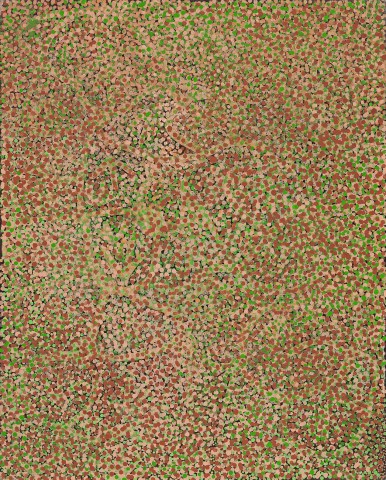EMU ALL OVER, 1990
EMILY KAME KNGWARREYE
synthetic polymer paint on linen
150.0 x 121.0 cm
bears inscription verso: artist’s name, Commissioned by Delmore Gallery, and Delmore Gallery cat. 0L07
Commissioned by Delmore Gallery, via Alice Springs
Thomas Vroom Collection, Amsterdam
Isaacs, J., Smith, T., Ryan, J., Holt, D., and Holt, J., Emily Kame Kngwarreye Paintings, Craftsman House, Sydney, 1998, pl. 10, p. 53 (illus.)
Ankerr (Emu), 1989, synthetic polymer paint on canvas, 150.6 × 121.8 cm, in the collection of the National Gallery of Victoria, Melbourne, illus. in Isaacs, J., Smith, T., Ryan, J., Holt, D., and Holt, J., Emily Kame Kngwarreye Paintings, Craftsman House, Sydney, 1998, pl. 2, p. 45
After the Rain, 1990, synthetic polymer paint on canvas, 210.8 × 121.6 cm, in the collection of the National Gallery of Victoria, Melbourne, illus. in Neale, M., Emily Kame Kngwarreye: Alhalkere, Paintings from Utopia, Macmillan Publishers, Melbourne, 1998, pl. 53, cat. 36, p. 86 and Neale, M. (ed.), Utopia: The Genius of Emily Kame Kngwarreye, National Museum of Australia Press, Canberra, 2008, cat. D-14, p. 126
‘All the paintings of Emily Kngwarreye, so spectacular and diverse in style, express a central theme – that of her identification with the earth and land itself: Anmatyerre country, the country of the yam and the emu’.1 Emily Kngwarreye's paintings are complex and vibrant visions of her country (Alhalkere) and women's ceremonies (Awelye). Despite finding artistic recognition late in life, her practice had been developing for many years and was fundamental to her role as a senior Anmatyerre woman, painting women’s bodies and objects for ritual and ceremonies. It was this knowledge and history that informed her work and which the detailed surface of Emu All Over, 1990 brings together in a shimmering example.
Emu all Over is a significant early work, replete with a full complement of the artist’s stylistic elements. Painted on a black ground, the underlying tracery of dusky pink lines signifying the meandering roots of the yam below the earth and the tracks of the travelling emu above, are covered by layers of green, ochre and pink dots which represent the surrounding seeds, flowers and leaves. Fundamentally, this work depicts the relationship between the emu and country. Beneath the soil the bush potato (anatye) is ready for digging, while above, there is a flurry of movement as the male emu moves across the landscape feeding on various seeds. Responsible for caring for the eggs and vulnerable hatchlings, the emu eats and regurgitates seeds onto the ground for his chicks to eat, keeping them close by and protecting them from predators.
It was during the 1990s that Emily Kngwarreye emerged as one of Australia's leading contemporary painters, the demand for her work unprecedented as international and local collectors and museums clamoured to obtain an ‘Emily’. In the years until her death in 1996, Kngwarreye was hailed as ‘an outstanding abstract painter, certainly among the best Australian artists, arguably among the best of her time’.2Although she had little contact with the outside world for most of her life, she produced a body of work which radically altered the way in which we view and appreciate modern Aboriginal art.
1. Isaacs, J., ‘Anmatyerre Woman’ in Emily Kngwarreye Paintings, Craftsman House, Sydney, 1998, p. 12
2. Smith, T., ‘Kngwarreye Woman Abstract Painter’, ibid., p. 24
CRISPIN GUTTERIDGE
